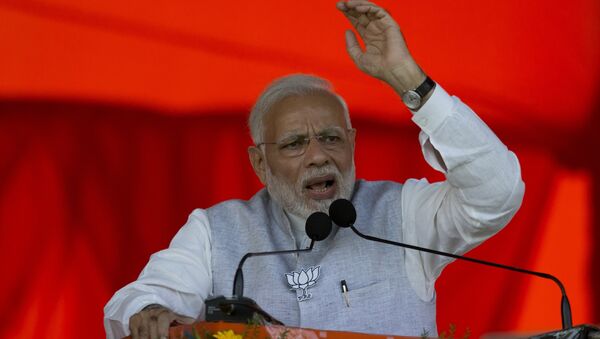New Delhi (Sputnik): The presence of Bay of Bengal Initiative for Multi-Sectoral Technical and Economic Cooperation (BIMSTEC) leaders at the swearing-in ceremony of Prime Minister Narendra Modi for his second term holds significance, says Harsh Pant of the Observer Research Foundation, an Indian think-tank. The invitation extended to these leaders is a strategic trade move for the Modi government 2.0, believes expert Harsh Pant, director of studies and head of the Strategic Studies Programme at the Observer Research Foundation in New Delhi.
— PMO India (@PMOIndia) May 31, 2019
— PMO India (@PMOIndia) May 31, 2019
BIMSTEC leaders, including President of Sri Lanka Maithripala Sirisena, President of Myanmar U. Win Myint, and President of Bangladesh Mohammad Abdul Hamid, Bhutan Prime Minister Dr Lotay Tshering, as well as Nepal Prime Minister K. P. Sharma Oli, along with Special Envoy of Thailand Grisada Boonrach, and President of the Kyrgyz Republic Sooronbay Jeenbekov (Shanghai Cooperation Organisation chair) were present on the occasion on Thursday.
“The significance of inviting the BIMSTEC leaders was that India is looking to re-arrange its foreign policy from the West towards the East. The policy of looking towards the West did not help us as we were stuck in a roadblock with Pakistan”, he said.
“Due to the Indo-Pak disputes on various issues including terrorism, there was always a friction between the two countries. In spite several initiatives in the first 1.5 years of the previous Modi government, we were heading no-where”, Pant added.
The BIMSTEC countries are all defined by their presence in the Bay of Bengal, the north-eastern part of the Indian Ocean.
After being initially established in 1997, the body has recently had exploratory talks for a BIMSTEC free trade zone. India invited the BIMSTEC leaders keeping in view the government's focus on its “Neighbourhood First” approach.
According to Pant, making the leaders attend such a special event is a strong attempt to make BIMSTEC a much more strong and proactive organisation than it has been in the past.
“[The] Modi government in the last few years has had continued insistence on to engage with their eastern neighbours more significantly. It is because India wants to redefine that engagement not just in terms of South Asia, but by including Myanmar and Thailand towards the larger destination of India’s neighbourhood, which involves eastern Southeast Asia as well”, he added.
In his first term, Prime Minister Modi’s oath taking ceremony in 2014 witnessed the invitation to SAARC leaders, including the head of governments of Pakistan and Afghanistan.
READ MORE: Pakistani Officials Not Invited to Modi’s Swearing-in Ceremony — Source
Pakistan has been one of the most noticeable misses this time around.
Pant explained “With the change in invites of 2014 and 2019, you may see a clear policy shift. I believe that Modi has understood that the conflict with Pakistan was perpetual. As the two countries were never able to be on the same page, the SAARC process in general became a dead process for India”.
“With regard to Afghanistan, I believe that improving relations with the Kyrgyz President would surely be of help. He being head of SCO signifies that India wants to expand its reach to Central Asia. India’s policy could be to look to do it through Central Asia rather than Pakistan”, he added.
In November 2014, India and Pakistan were believed to have had a fall-out in the SAARC summit hosted in Nepal over issues related to road and rail connectivity infrastructure between the bloc nations.
India subsequently boycotted the SAARC summit in 2016, which was to be hosted by Pakistan.
India alleged that the reason for the boycott was an attack on their military camp in Uri a few months earlier, for which they had blamed Pakistan-based militants. Pakistan, however, denied those allegations.
The views and opinions expressed in this article are those of the speaker and do not necessarily reflect Sputnik's position.

